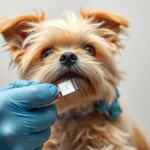
Introduction
Ensuring the health and well-being of our canine companions is essential for any dog owner. Just like humans, dogs require a balanced diet rich in essential nutrients for optimal health. One of the critical aspects of dog health care is understanding the connection between vitamin deficiencies and hair loss in dogs. In this article, we will explore what vitamin deficiency causes hair loss in dogs, the symptoms associated with these deficiencies, and the best ways to remedy them.
By educating ourselves about these issues, we can provide better care for our furry friends and help maintain their vibrant coats and overall health.
Understanding Dog Hair Loss
Types of Hair Loss in Dogs
Hair loss in dogs can manifest in various forms, and not all types are indicative of a health issue. Some common types of hair loss include:
- Seasonal Shedding: Most dogs experience increased shedding during seasonal changes, especially in spring and fall.
- Alopecia: This is a more severe condition where patches of hair are lost, often due to underlying health issues.
- Bald Spots: Patches of hair loss that can occur due to infections, allergies, or hormonal imbalances.
Common Causes of Hair Loss
While nutritional deficiencies can play a significant role in hair loss, it is essential to recognize that there are non-nutritional factors as well. Common causes of hair loss in dogs include:
- Allergies: Environmental allergens or food sensitivities can lead to itching and subsequent hair loss.
- Parasites: Fleas, ticks, and mites can cause irritation, leading to excessive scratching and hair loss.
- Infections: Bacterial or fungal infections can also result in hair loss.
Regardless of the cause, maintaining a proper nutritional balance is crucial for promoting a healthy coat and minimizing the risk of hair loss.
Importance of Vitamins in Dog Health
Essential Vitamins for Dogs
Vitamins are vital for numerous bodily functions in dogs. Some of the essential vitamins include:
- Vitamin A: Supports vision and skin health.
- Vitamin B Complex: A group of vitamins that help with energy metabolism and skin health.
- Vitamin C: An antioxidant that supports the immune system.
- Vitamin D: Essential for calcium absorption.
- Vitamin E: Protects cells and aids in skin health.
- Vitamin K: Crucial for blood clotting and bone health.
Among these, certain vitamins are particularly important for maintaining skin and coat health.
Consequences of Vitamin Deficiencies
Vitamin deficiencies can lead to various health problems, including poor coat condition and hair loss. Symptoms of vitamin deficiencies in dogs may include:
- Dull, brittle fur
- Skin irritations or infections
- Excessive shedding or bald patches
- Flaky or dry skin
Recognizing these symptoms early can help prevent further health complications.
Key Vitamins Linked to Hair Loss in Dogs
Vitamin A Deficiency
Vitamin A plays a crucial role in maintaining skin health and promoting a shiny coat. Dogs deficient in Vitamin A may exhibit symptoms such as:
- Dry, flaky skin
- Dull or brittle fur
- Increased susceptibility to skin infections
A lack of this essential vitamin can lead to significant hair loss, emphasizing the importance of a balanced diet.
Vitamin B Complex Deficiency
The B vitamins are a group of water-soluble vitamins that play essential roles in energy metabolism and overall health. The B vitamin complex includes:
- B1 (Thiamine)
- B2 (Riboflavin)
- B3 (Niacin)
- B5 (Pantothenic Acid)
- B6 (Pyridoxine)
- B7 (Biotin)
- B9 (Folate)
- B12 (Cobalamin)
Among these, Biotin (B7) is particularly significant for fur health. Dogs with a deficiency in Biotin may show signs such as:
- Thinning fur or bald patches
- Brittle or breaking hair
- Skin lesions or irritations
Ensuring that your dog’s diet includes sufficient B vitamins is crucial for maintaining a healthy coat.
Vitamin E Deficiency
Vitamin E is another vital nutrient for skin health and immune function. It acts as an antioxidant, protecting cells from damage. A deficiency in Vitamin E can lead to:
- Poor coat condition
- Increased susceptibility to skin infections
- Hair loss
Dogs lacking this vitamin may exhibit rough, dry skin and a lackluster coat, further highlighting the importance of proper nutrition.
Omega Fatty Acids
While not vitamins, Omega-3 and Omega-6 fatty acids are essential for maintaining healthy skin and coat in dogs. They help in:
- Reducing inflammation
- Promoting skin hydration
- Supporting overall coat health
A deficiency in these fatty acids can lead to dry, flaky skin and excessive shedding, contributing to hair loss.
Diagnosing Vitamin Deficiencies
Recognizing Symptoms
As a dog owner, it is essential to be vigilant about any changes in your pet’s coat and overall health. Symptoms of vitamin deficiencies may include:
- Changes in coat texture or appearance
- Increased shedding or bald patches
- Skin irritations or infections
- Lethargy or changes in behavior
Observing these signs can help you determine whether your dog may be experiencing a vitamin deficiency.
Veterinary Diagnosis
If you suspect your dog has a vitamin deficiency, consulting a veterinarian is crucial. A veterinarian can perform various tests and evaluations, which may include:
- Blood Tests: To check for nutrient levels and overall health.
- Dietary Assessments: Evaluating the dog’s current diet to determine if it meets nutritional needs.
With professional guidance, you can develop a plan to address any deficiencies and improve your dog’s health.
Treatment and Prevention of Vitamin Deficiencies
Dietary Adjustments
One of the most effective ways to address vitamin deficiencies in dogs is through dietary adjustments. Here are some recommendations:
- Balanced Dog Diet: Ensure your dog’s diet includes high-quality commercial dog food or a well-planned homemade diet that meets all nutritional requirements.
- Foods Rich in Essential Vitamins: Incorporate foods such as carrots (for Vitamin A), eggs (for Biotin), and fish (for Omega fatty acids) to enhance your dog’s diet.
Supplements for Dogs
In some cases, dietary adjustments may not suffice, and supplementation may be necessary. Here are some points to consider regarding supplements:
- Vitamin Supplements: There are various vitamin supplements available for dogs that can help address specific deficiencies.
- Consult a Veterinarian: Always consult with your veterinarian before starting any supplementation to avoid potential risks and ensure the correct dosage.
Regular Vet Check-ups
Preventive care is vital to maintaining your dog’s health. Regular veterinary visits can help:
- Detect deficiencies before they lead to more severe health problems.
- Monitor your dog’s overall health and well-being.
- Provide guidance on proper nutrition and dietary needs.
Routine check-ups are an essential part of effective dog health care.
Conclusion
Addressing vitamin deficiencies is crucial for preventing hair loss in dogs. By understanding the essential vitamins and their roles, dog owners can take proactive steps to ensure their pets receive the necessary nutrients for a healthy coat and overall well-being. Regular veterinary consultations, a balanced diet, and awareness of symptoms are key to promoting optimal health in your canine companion.
As dog owners, it is our responsibility to provide the best care possible, ensuring our furry friends live healthy, happy lives.









